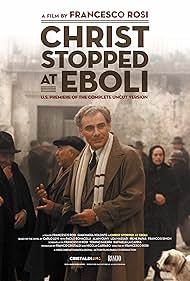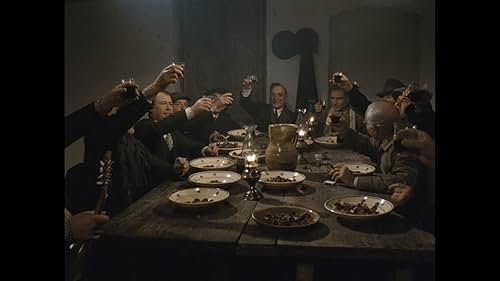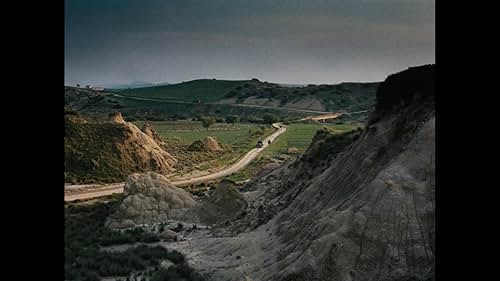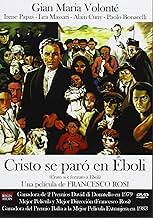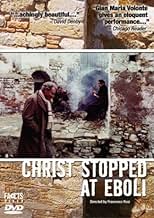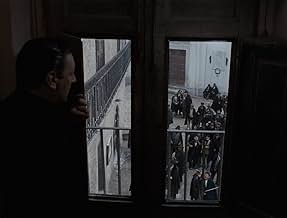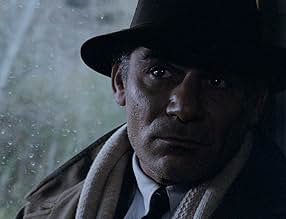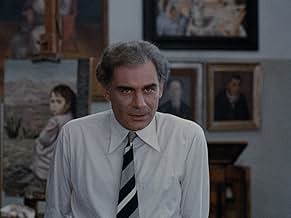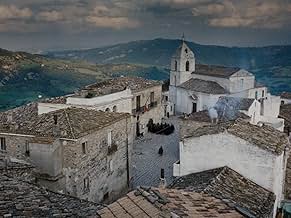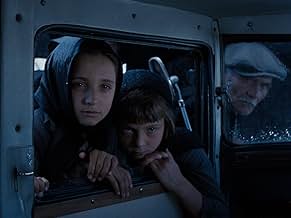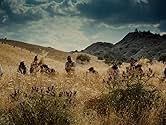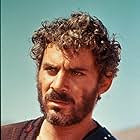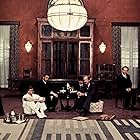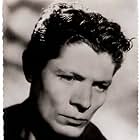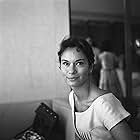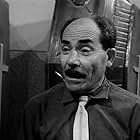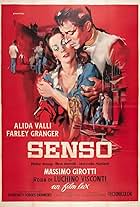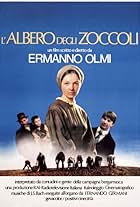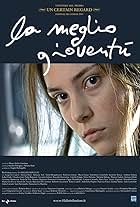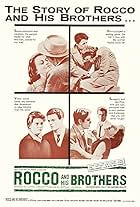Cristo si è fermato a Eboli
- 1979
- 2h 30m
ÉVALUATION IMDb
7,7/10
3,9 k
MA NOTE
Un médecin en Italie fasciste est exilé dans un village reculé à cause de ses opinions politiques.Un médecin en Italie fasciste est exilé dans un village reculé à cause de ses opinions politiques.Un médecin en Italie fasciste est exilé dans un village reculé à cause de ses opinions politiques.
- A remporté le prix 1 BAFTA Award
- 7 victoires et 1 nomination au total
Enzo Vitale
- Dottore Milillo
- (as Vincenzo Vitale)
Histoire
Le saviez-vous
- AnecdotesThe title of the film and its source novel comes from an expression by the people of Gagliano who say of themselves, "Christ stopped short of here, at Eboli" which means, in effect, that they feel they have been bypassed by Christianity, by morality, by history itself-that they have somehow been excluded from the full human experience.
- GaffesOn the bus, the way Carlo holds the dog changes.
- Citations
Luisa Levi: You'd need a woman here.
Carlo Levi: Yes, I would. But it's not easy.
Luisa Levi: Come on, don't exaggerate. Don't tell me that here even finding a cleaning lady is impossible.
Carlo Levi: Here a woman wouldn't go in the house of a single man. Just spending time together implies sleeping together.
Luisa Levi: You can't be serious.
Carlo Levi: Oh, yes I am.
- Autres versionsThere are many versions ranging from 120 minutes to 222 minutes. The longest version available in the U.S. is 222 minutes and is available from the Criterion Collection on Blu-ray.
- ConnexionsFeatured in Il cineasta e il labirinto (2004)
Commentaire en vedette
Christ Stopped at Eboli is one of the best movies by Rossi, loyal to his tradition of neorealism. The movie depicts isolated rural-peasant life as an account of an urban intellectual doctor, painter and a political activist who has been exiled to this remote area due to his political dissent during the Fascist rule in Italy. Not like similar movies in lenght, Crist Stopped at Eboli constantly absorbs audience, probably due to its realist description and selective representation of peasant life which is "frozen in time". The film pushes the audience to contemplate on philosophical aspects of the concept of time and it is heavily imbued with the display of social and political problems.
Rosi beautifully describes the destitute of the peasant settlers of this remote and isolated land, their ignorance and apolitical life, the deep rift between these people and state, and the irrelevance of the quasi-comic "victories" of the Il Duce to these people among many other social and political issues. Like Rosi's other movies here again neorealist representation goes along with the combination of documentary techniques and fictional context. Rosi lets the images to speak for themselves rather than the Gian Maria Volente who is in the central role in the movie.
In the movie (as it is in the book), the peasant life and urbanity are represented as two alien civilizations and antithesis of each other. These peasants have their own way of life, own customs, own aspirations and means of joy. What is going on Rome or the war in Abyssinia for "regaining the glory of the Rome" does not capture their interest. They are aware of the state through the taxes collected or men called for military service. In his letter, Levi describes the urban civilization as an antithesis of this peasant life which aspired throughout the history to "colonize" it.
The Christ Stopped at Eboli also pushes the audience to ponder on the philosophical meaning of history, its relevance nature and meaning. It describes this peasant life as "frozen in history", cut from outside life and lacking the understanding of time that we have. History as we understand is the history of "urban civilization". As peasants are alien to this civilization they are alien to this concept of time as well. In the village you stop counting days, hours as they become more and more irrelevant, there you return and base your life on the natural cycle of life which is based on seasons. In this sense the movie challenges our notion of history which is the history of the "city".
In this sense Christ Stopped at Eboli is very analogous to Y. K. Karaosmanoğlu's Yaban. Yaban is also the story of a Turkish intellectual war veteran who abandons amenities of Istanbul for the Central Anatolian village with the hope of finding his roots and alleviating the torments of his memoirs. However, to his disappointment he finds himself in an alien peasant "civilization" where he can not communicate to those people, can not be similar to them and can not understand their aspirations. What makes Yaban and Christ stopped at Eboli similar is their approach to dichotomous nature of human civilization and the concept of time. In both novels there is a representation of antagonist peasant and urban civilizations, and a relative concept of time. In both novels there is description of life which is "frozen in time" and alien to urbanity. Indeed the study of Yaban from this perspective can be insightful for the discussions of continuity and change in the History of Mediterranean, as Turkey is widely excluded from such studies. However when you read Christ stopped at Eboli and Yaban what strikes you first is the patterns of similarity in peasant life and experience of the intellectuals visiting these places. They can back both the universality of "two civilizations" argument and lounge duree approach in the Mediterranean area.
Rosi beautifully describes the destitute of the peasant settlers of this remote and isolated land, their ignorance and apolitical life, the deep rift between these people and state, and the irrelevance of the quasi-comic "victories" of the Il Duce to these people among many other social and political issues. Like Rosi's other movies here again neorealist representation goes along with the combination of documentary techniques and fictional context. Rosi lets the images to speak for themselves rather than the Gian Maria Volente who is in the central role in the movie.
In the movie (as it is in the book), the peasant life and urbanity are represented as two alien civilizations and antithesis of each other. These peasants have their own way of life, own customs, own aspirations and means of joy. What is going on Rome or the war in Abyssinia for "regaining the glory of the Rome" does not capture their interest. They are aware of the state through the taxes collected or men called for military service. In his letter, Levi describes the urban civilization as an antithesis of this peasant life which aspired throughout the history to "colonize" it.
The Christ Stopped at Eboli also pushes the audience to ponder on the philosophical meaning of history, its relevance nature and meaning. It describes this peasant life as "frozen in history", cut from outside life and lacking the understanding of time that we have. History as we understand is the history of "urban civilization". As peasants are alien to this civilization they are alien to this concept of time as well. In the village you stop counting days, hours as they become more and more irrelevant, there you return and base your life on the natural cycle of life which is based on seasons. In this sense the movie challenges our notion of history which is the history of the "city".
In this sense Christ Stopped at Eboli is very analogous to Y. K. Karaosmanoğlu's Yaban. Yaban is also the story of a Turkish intellectual war veteran who abandons amenities of Istanbul for the Central Anatolian village with the hope of finding his roots and alleviating the torments of his memoirs. However, to his disappointment he finds himself in an alien peasant "civilization" where he can not communicate to those people, can not be similar to them and can not understand their aspirations. What makes Yaban and Christ stopped at Eboli similar is their approach to dichotomous nature of human civilization and the concept of time. In both novels there is a representation of antagonist peasant and urban civilizations, and a relative concept of time. In both novels there is description of life which is "frozen in time" and alien to urbanity. Indeed the study of Yaban from this perspective can be insightful for the discussions of continuity and change in the History of Mediterranean, as Turkey is widely excluded from such studies. However when you read Christ stopped at Eboli and Yaban what strikes you first is the patterns of similarity in peasant life and experience of the intellectuals visiting these places. They can back both the universality of "two civilizations" argument and lounge duree approach in the Mediterranean area.
- kuheylanus
- 8 mars 2005
- Lien permanent
Meilleurs choix
Connectez-vous pour évaluer et surveiller les recommandations personnalisées
- How long is Christ Stopped at Eboli?Propulsé par Alexa
Détails
- Date de sortie
- Pays d’origine
- Site officiel
- Langue
- Aussi connu sous le nom de
- Christ Stopped at Eboli
- Lieux de tournage
- Aliano, Matera, Basilicata, Italie(second house where Levi lives)
- sociétés de production
- Consultez plus de crédits d'entreprise sur IMDbPro
Box-office
- Brut – États-Unis et Canada
- 78 736 $ US
- Fin de semaine d'ouverture – États-Unis et Canada
- 9 006 $ US
- 7 avr. 2019
- Brut – à l'échelle mondiale
- 78 736 $ US
Contribuer à cette page
Suggérer une modification ou ajouter du contenu manquant

Lacune principale
By what name was Cristo si è fermato a Eboli (1979) officially released in India in English?
Répondre